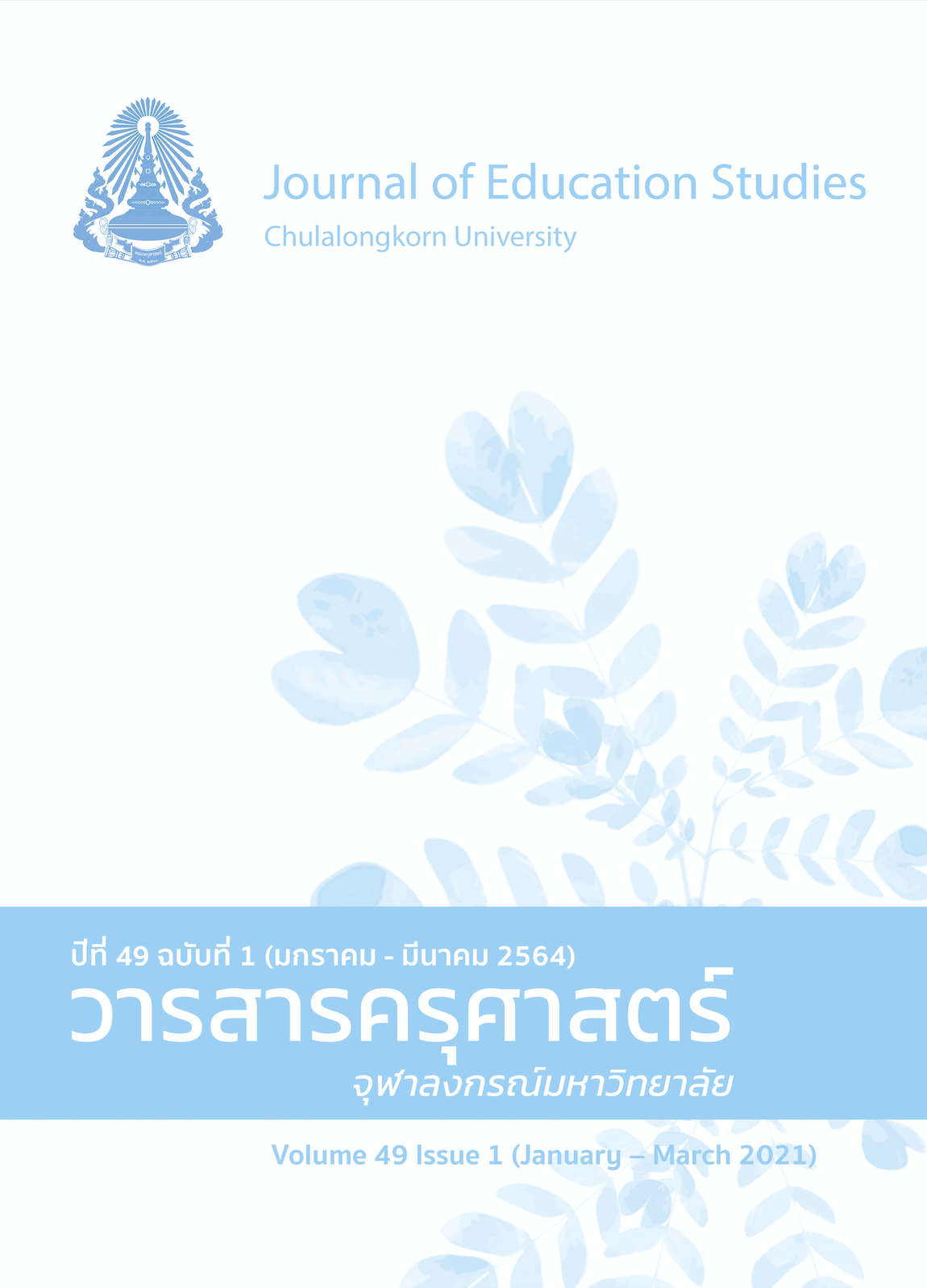Development of a Transformative Process to Sustainable Development of Highland Karen
DOI:
https://doi.org/10.14456/educu.2021.10Keywords:
sustainable development, highland Karen communitiesAbstract
This research aimed to 1) develop sustainable development indicators for highland Karen communities, 2) analyse a transformative process for the sustainable development of highland Karen communities, and 3) provide guidelines for a learning process to transform the sustainable development of highland Karen communities. The results showed that there were 4 sustainable development indicators. These included conserving beliefs and values in relation to nature, conserving traditional rice-growing processes, conserving local wisdom concerning natural resources management, and conserving community ethics. As a consequence, highland Karen communities advanced their beliefs and attitudes, paying less attention to local traditions and wisdom. Rice growing in the traditional way decreased, while economic crops increased and natural resources were destroyed. In order to sustainably develop highland Karen communities, it is necessary to restore the 7 moral values of the community. These measures include upholding natural resources, gratitude, sufficiency, fairness, helping and caring for each other, paying respect to elders and good people, and participating in community work. In addition, 12 types of local wisdom should be preserved. Two types of modern knowledge, including health care and community management, should be applied. For the learning process, 4 methods of traditional community learning should be combined with modern education by placing the community at the centre. Officials and natural leaders should coordinate their roles in order to drive community development while at the same time preserving the community culture.
References
กรมพัฒนาสังคมและสวัสดิการ. (2545). ทำเนียบชุมชนบนพื้นที่สูง 20 จังหวัด ในประเทศไทย พ.ศ. 2545. เนติกุลการพิมพ์.
พระธรรมปิฎก (ป.อ. ปยุตฺโต). (2549). การพัฒนาที่ยั่งยืน. มูลนิธิโกมลคีมทอง.
พฤทธิ์ ศิริบรรณพิทักษ์. (2546). เอกสารประกอบการสอนวิชาการศึกษาเพื่อการพัฒนาที่ยั่งยืน [เอกสารไม่ได้ตีพิมพ์]. คณะครุศาสตร์ จุฬาลงกรณ์มหาวิทยาลัย.
เพ็ญสิริ จีระเดชากุล. (2541). สถานภาพและการดำรงชีวิตของชาวเขาและชนกลุ่มน้อยในประเทศไทย : การศึกษาของชาวเขาในประเทศไทย. สำนักงานกองทุนสนับสนุนการวิจัย (สกว.).
ไพฑูรย์ สินลารัตน์ และคณะ. (2550). การเปลี่ยนผ่านการศึกษาเข้าสู่เศรษฐกิจฐานความรู้. สำนักงานคณะกรรมการการวิจัยแห่งชาติ.
วิลาสินี อโนมะศิริ, พรรณิภา บูรพาชีพ, และ ณรงค์ ใจหาญ. (2541). ชาวเขากับการอนุรักษ์ทรัพยากรธรรมชาติ : ป่าไม้และน้ำ. สำนักงานกองทุนสนับสนุนการวิจัย.
วิศนี ศิลตระกูล.(2541). การพัฒนารูปแบบการศึกษานอกโรงเรียนเพื่อปรับปรุงคุณภาพชีวิตและสังคมตามแนวความคิดการพัฒนาที่ยั่งยืนในเขตอุตสาหกรรม [วิทยานิพนธ์ปริญญาดุษฎีบัณฑิต ไม่ได้ตีพิมพ์]. สาขาวิชาพัฒนศึกษา คณะครุศาสตร์ จุฬาลงกรณ์มหาวิทยาลัย.
สำนักงานคณะกรรมการพัฒนาการเศรษฐกิจและสังคมแห่งชาติ. (2550). แผนพัฒนาเศรษฐกิจและสังคมแห่งชาติ ฉบับที่สิบ พ.ศ. 2550-2554. วิ.จี.พริ้นติ้ง.
สำนักงานคณะกรรมการพัฒนาการเศรษฐกิจและสังคมแห่งชาติและสถาบันสิ่งแวดล้อมไทย. (2549). คู่มือการจัดทำตัวชี้วัดการพัฒนาที่ยั่งยืนของประเทศไทย. โครงการพัฒนาดัชนีชี้วัดการพัฒนาที่ยั่งยืนของประเทศไทย ระยะที่สอง.
อมรา พงศาพิชญ์. (2543). ความหลากหลายทางวัฒนธรรม (วิธีวิทยาและบทบาทในประชาสังคม). สำนักพิมพ์แห่งจุฬาลงกรณ์มหาวิทยาลัย.
อนุรักษ์ ปัญญานุวัฒน์. (2548). การศึกษาชุมชนเชิงพหุลักษณ์ : บทเรียนจากวิจัยภาคสนาม. โครงการเสริมสร้างการเรียนรู้เพื่อชุมชนเป็นสุข (สรส.).
ภาษาอังกฤษ
McGonigal, K. (2005). Teaching for transformation: From learning theory to teaching strategies. Speaking of Teaching, 14(2), 1-4.
UNESCO. (2005). A situational analysis of education for sustainable development in the Asia-Pacific region. UNESCO Bangkok.
Downloads
Published
How to Cite
Issue
Section
License

This work is licensed under a Creative Commons Attribution-NonCommercial-NoDerivatives 4.0 International License.




